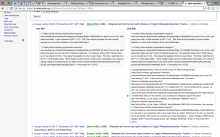From @Alsee on https://en.wikipedia.org/wiki/Wikipedia_talk:Community_health_initiative_on_English_Wikipedia
User story: I want to examine and understand the sequence edits of another user. Maybe they are stalking another user, maybe they are pushing a conflict across multiple pages, maybe they are an undisclosed paid editor.
When I view the history of a page, each diff has very helpful links at the top for next-edit and previous-edit. That's great for walking through the history of that page.
When I view the contribution history of a user, opening one of the edit-links will open a diff of the target page. As noted above, that diff page has links for next-edit-to-that-page and previous-edit-to-that-page. In most cases that is exactly what we want. However those next&previous links are useless when I'm trying to walk through the edits of a particular user. In that case what I really want is next&previous links for edits by that user.
Working from a user's contribution history page is possible, but very awkward. Either I have to go down the list opening each edit in a new tab, or I have to use the browser's back button to continually reload the contribution history page.
I find it hard to picture a good user-interface solution for this use case. All of the options I can think of would either be wrong for the more common case, or they would unduly clutter the user interface. It would be great if you can come up with a good solution for this.
